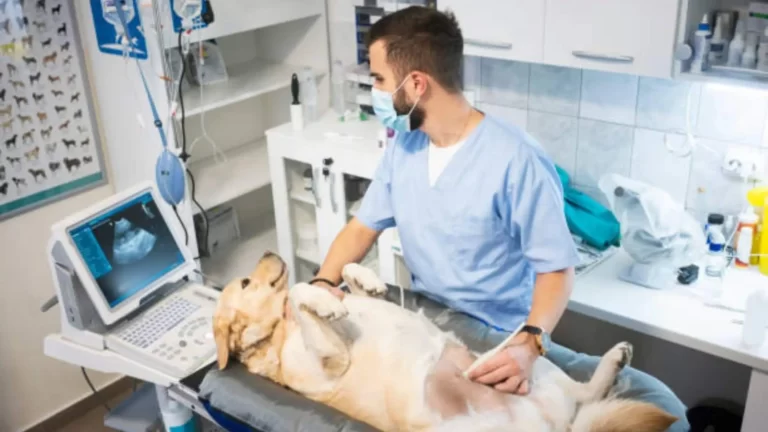How Often Should I take my Dog to the Vet?
Our canine friends need preventative health care just as much as we do. As per the AAHA, preventive treatment enables us to offer more animals a better chance at living longer and healthier lives.
Regular visits to the vet are the first step in keeping your dog healthy, so you might be wondering how frequently you should do so.
Your dog needs to get a wellness exam at least once each year. The frequency of vet visits depends upon your dog’s age, lifestyle, current medical condition, and many other factors.
We’ll go through a breakdown of how frequently, dependent on age, you might need to take your dog to the Veterinarian below.
Appointments to the Veterinarian for puppies
The first year of your new puppy’s life is probably when you’ll go to the Veterinarian’s office the most.
Making sure to bring your dog in for all their puppy checkups is among the most crucial things you can do for their health as a puppy.
These sessions also serve the fundamental purpose of educating the parent about their puppies:
- Development
- Nutrition
- Diseases
- Grooming
- Behavioral pattern
And several other factors that need attention throughout the lifecycle of a pet.
Working with your Veterinarian to ensure your puppy has all the immunizations they prescribe is one of the ways to ensure they get off to a good start. Vaccinations aid in the immune system development of your dog and stop the spread of disease.
Following are the ages and respective vaccinations recommended as per the AAHA:
5 Core vaccinations – 6 to 8 weeks old
These 5 core vaccinations include :
- Canine distemper virus
- Parvovirus
- Adenovirus – 2
- Parainfluenza [might not get covered in some of the vaccine combinations ]
Booster injection dosages are necessary until 16 weeks, at every 3 – 4 weeks intervals. Your Dog needs to have completed at least 3 months of age to get Rabies vaccine shots.
Vets may also recommend non-core vaccinations for the prevention of diseases like the following:
- Canine Flu
- Lyme Disease
- Bordetella
Again, these solely depend on your puppy’s medical status, lifestyle, and environment.
These appointments mainly include a vet examination of your puppy’s overall Growth and development. Owners should always ask for vets’ advice on :
- Training
- Socializing
- Training Methods
- Nutrition
One of the Expert tips to make your vet visits easy is to keep a toy in the cage you’re going to use to transport your pet to the clinic so that it creates a positive effect on your pet’s mind and they won’t avoid or show resistance towards vet visits.
Vet appointments for adult dogs
For ages one to seven, adult dogs should usually get yearly checkups. Through their mature years, one annual wellness exam should be enough if your dog is healthy, doesn’t need booster injections on a more frequent schedule, and doesn’t have any issues that require a solution.
The physical examination is the most crucial component of your dog’s yearly checkup. Your vet will give a thorough exam from tail to nose, which includes:
- Vital Signs
- Weighing
- Examination for lumps or bumps
- Heart Examination
- Lung examination
- Dental health examination
- Joint and Bone Health
- Nutritional Status
If there is a problem, your Veterinarian may advise testing or treatment as necessary. Your Veterinarian may also ask if you have any concerns you’d want to share. If you have any questions, this is a great moment to ask your Veterinarian, so be sure to write them down in advance, so you don’t forget anything.
Usual annual checkups include :
- Vaccine booster doses
- Stool test
- Growth and development variations
- Nutritional status
- Hygiene status
- Dental Checkups
- Hormonal Checks
- Bone Checkups
- Complete cardiac checkups
- Anaerobic Stress checkups
Vets may recommend a Faecal/Stool test if there are any symptoms of an Intestinal parasite.
It is usually recommended to have this test once a year to ensure your pet’s good gut health.
Some establishments need this vaccination every six months, in which case your dog will need to visit the vet twice a year. Based on risk level, region, and lifestyle, your Veterinarian can assist you in determining which, if any, further immunizations will be good for your pet’s health.
Your Veterinarian will go over parasite prevention in addition to vaccinations, such as heartworm, flea, and tick prevention. Even if they are on heartworm prophylactic, the vet may advise you to take a heartworm test once a year for your dog.
You might need to take your dog to the vet more frequently than once a year if they have underlying health problems to receive the appropriate testing or treatment.
Vet appointments for elderly dogs
Eight-year-old canines and older should frequently benefit from twice-yearly checkups at the vet’s office. Seeing your Veterinarian twice a year can help you address any issues before they arise because older dogs are more vulnerable to illness and injury.
Your Veterinarian will do a thorough physical examination during these wellness appointments, particularly in areas that often affect older dogs. For instance, your Veterinarian will carefully examine your dog’s teeth and offer more oral hygiene advice.
They will also weigh your dog and look for joint discomfort or movement problems. One of your Veterinarian’s legal advice is to perform yearly blood and urine tests to monitor the health of your internal organs.
For older dogs, the vet may insist on applying Vaccine boosters or parasite management. This, again, totally depends on your dog’s current health status.
Depending on their health and any diseases or concerns that may arise as they age, your dog may need to visit the vet more frequently. This is why health insurance is beneficial if you have an older dog!
Situations under which you should take your dog right away to the vet?
Ideally, you’ll only need to take your dog to the vet for routine checkups. But crises do happen occasionally, and being aware of what to watch for can help you be ready to react swiftly when they do.
Following are the scenarios under which immediate Medical attention is required:
- Your dog appears to be missing a bone or to be unable to move its legs.
- Your puppy seems to be in excruciating discomfort.
- The dog is convulsing.
- Your dog is asleep, has extreme lethargy, or your dog resists waking up after continuous tries.
- There is an eye injury on our dog.
- You suspect or know your dog consumed poison (e.g., antifreeze, chocolate, rat poison).
- Your dog has had severe diarrhea or vomiting or has refused water for at least 24 hours.
- Your dog appears to be choking or to be experiencing respiratory difficulties.
- Your dog is coughing up blood, has blood in its pee, or is bleeding and won’t stop.
- Under any scenario of dog assault by another animal, an automobile, or an oversized item.
The AVMA advises calling your Veterinarian at the very least if you have concerns about your dog’s health. Remember that you are the expert on your dog, so it is usually worthwhile to get it looked at if you see anything abnormal or out of the ordinary.
Which vaccinations do dogs need?
Your dog can avoid contracting dangerous illnesses, some of which can be fatal, by receiving routine vaccinations.
Some of the common vaccines required for all types of Canines are:
- Rabies
- Distemper
- Dog hepatitis
- Dog parvovirus
Final Thoughts
A trustworthy Vet is like a good friend who ensures you and your pet don’t have to suffer. A good vet is a resource one should value as if the vet shares a good connection with your dog, being able to diagnose appropriately precisely for your dog is a significant relief, and one should always try to maintain the same vet for pets’ entire life.





